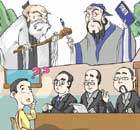Op-Ed Contributors
Arms ban tarnishes EU image
By Fang Lexian (China Daily)
Updated: 2010-02-09 07:47
 |
Large Medium Small |
The pros and cons of the long-standing arms embargo against China will be weighed by Spain, said Miguel Angel Moratinos, the country's foreign minister, and it will reconsider lifting the embargo in its position as European Union leader.
The Jan 26 announcement grabbed the attention of the Chinese media and the spokesperson for China's Foreign Ministry, who stressed that Beijing hopes that the EU will decide early to unconditionally lift the arms embargo to remove any impediments to the development of the China-EU relationship.
The announcement, however, to consider lifting the embargo against China is nothing new. But it is the political implications of the ban's removal that the Chinese government is paying more attention to, namely eliminating the political discrimination against China.
| ||||
Currently, amid gradually warming ties between China and the EU as well as the US' arms sale to Taiwan, Madrid's proposal has triggered remarkable concern for the sensibility and political implication of the issue.
It has been two decades since the EU imposed its arms embargo on China based on the bloc's determination of China's human-rights record. For China, the ban is a product of the West's Cold War mentality and is rooted in political prejudice. Since the beginning of the reform and opening-up in 1978, China has made tremendous achievements in economic growth as well as political and social progress, specifically in promoting and protecting human rights.
David Shambaugh, an expert on contemporary Chinese affairs, wrote of China's great changes in his article, "China's 60th Birthday: The Road to Prosperity" that was published in Time magazine last September. He recognized many important facts that have been ignored by numerous Western observers: China has successfully resolved the problem of food, clothing, housing and other basic needs for the world's largest population; both life expectancy and level of education have increased substantially; 200 million people shook off poverty and nine years of compulsory education have become available to more and more children.
This is the true portrayal of China's social and human rights progress. Ordinary Chinese today are benefiting from China's progress in human rights.
The EU's insistence in entangling China's human-rights record with the arms embargo certainly forces the Chinese government to regard this as political discrimination and an obstacle to the development of the China-EU partnership.
For ordinary Chinese people, the EU's long-held hesitation to end the ban not only results in their disappointment and dissatisfaction but also impacts the image of the EU and the standing of current China-EU relations.
According to a 2008 poll by the Institute of European Studies of the Chinese Academy of Social Sciences (CASS) that gathered the opinion of the Chinese public on the EU and China-EU ties in nine provinces, municipalities and autonomous regions including Beijing and Shanghai, the biggest problem was the EU's arms embargo against China, followed by issues concerning China's full market economy status, environment protection and energy security.
The survey showed that Chinese residents with high levels of education and income generally are more attentive to the arms embargo issue. Though many in the poll said there was friction and negativity in China-EU relations in 2008, Chinese people still held goodwill toward the EU. The survey's results are strikingly similar to findings from a BBC poll taken between November 2008 and January 2009.
As the problem is of great concern to the Chinese people, if the EU could make headway on this issue, it would be helpful for improving public opinion on the EU in China.
But the EU indeed faces complicated obstacles, such as intra-European discord and enormous pressure from the United States, whose opposition poses the largest obstacle for the EU. While the US has maintained the arms embargo against the mainland, its $6.4 billion arms sale to Taiwan not only has infuriated China but has also confused some EU member states. This is the logic of the US: One man may steal a house, while another may not look over the hedge.
Nonetheless, if the EU repeatedly resorts to excuses of external factors in its consideration of the ban, it will make people more convinced that the EU is still a political dwarf and that the bloc still has a long way to go before becoming a truly independent world power.
Considering the gaps between the current expectations of the EU and China's performance, there might not be a breakthrough on the issue in the short term unless EU leaders demonstrate extraordinary political courage and wisdom.
Based on their high opinion of China-EU relations, the Chinese government and the public think that lifting the outdated ban is the right thing to do to boost China-EU ties. If the EU consistently frustrates the Chinese by only making empty promises, the EU's image in China will continue to decline. Moreover, this will further convince the Chinese government and people to firmly adhere to the road of independent innovation, which actually might reap better results in the long run.
Therefore, in this regard, the EU should overcome the interference of external factors, surmount their own obstacles, abandon its political prejudice, and observe China's changes and development in a long-term strategic view.
Several knowledgeable Europeans have claimed that the EU has realized China's new role in the world and the potential benefits the bloc could gain through dialogue to improve bilateral relations. I hope this understanding can permeate through the EU to bring the China-EU relationship to a new level.
The author is a researcher with the School of International Studies, the Renmin University of China.
(China Daily 02/09/2010 page8)












